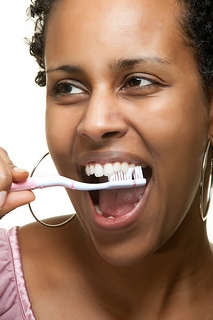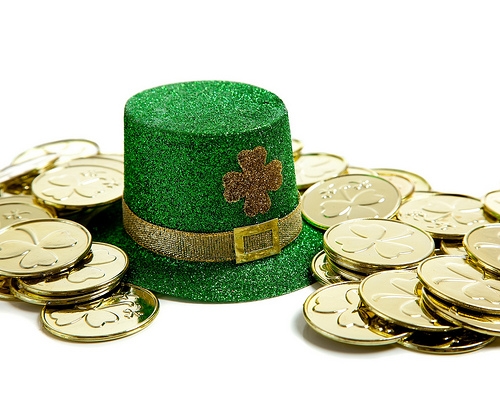My gums are shrinking!
March 29th, 2016

Have you ever looked in the mirror and noticed that your teeth looked longer? Does it seem like your gums are shrinking? This condition is called recession—many adults have it. Let’s look at some of the causes and what you can do about it.
During your exam at High Point Dental Group, we will take measurements to check for periodontal disease. Dental professionals take recession measurements to see how much attached gingiva is present. This is the kind of tissue that is most resilient to infection.
The more recession, the less attached gingiva. The less attached gingiva, the less bone support. The less bone support, the higher your chances of tooth loss. It is quite a domino effect.
Don’t lose hope. The effect can be halted once you know the cause of your recession.
Do you ever wake up with your jaw clenched, and/or a headache that originates just above your ears? Clenching or grinding your teeth can cause recession. When there is added stress on a tooth, it flexes at the gum line.
Over time this causes microscopic breaks in the enamel and then a notch appears. The gum line is forced to move away from its original position. If this is something you see in your mouth, we can discuss the possibility of an occlusal guard at your next visit.
How do you brush your teeth? Do you brush in a straight line or circles? What kind of bristles do you use? Are the bristles on your toothbrush frayed?
When you brush in a circle, you are sweeping all along the gum line, removing the plaque from most angles. When you brush in a straight line, you may often miss the concave portion of the gums. This leaves plaque behind and leads to gingivitis. Whenever gingivitis occurs, the body attacks supporting structures like bone while trying to get rid of the infection. This is periodontal disease, which can cause recession.
Recession may also result from an irritant on the gums, such as a bar from a partial denture or orthodontic appliance (braces).
Gums do not “grow back.” The most common treatment for advanced recession is a tissue graft. There are many different kinds of tissue grafts.
Other factors can cause recession. If you think recession is happening in your mouth, schedule an appointment with Dr. Angela Paros, Dr. Anthony Reganato and Dr. Matthew Hamedani to discuss your options, so you can make the appropriate treatment choice.
Canker sores, cold sores, and mouth sores: What's the difference?
March 22nd, 2016

At High Point Dental Group, we know many people have experienced some form of mouth sores or irritation. Some mouth sores are harmless and go away on their own after a few days, while others are more serious and should not be ignored. Mouth sores occur for many different reasons, but bacterial infections, viruses, or funguses often trigger them. The best way to tell the difference between a canker sore and a cold sore is that canker sores occur inside the mouth while cold sores occur on the outside the mouth.
The most common mouth sores are:
Canker sores: A non-contagious, small, grayish ulcer with a red border, canker sores appear inside the mouth. While outside factors such as stress, fatigue, or allergies may increase the chances of developing a canker sore, most health experts believe they stem from bacteria or a virus that attacks the immune system. Canker sores typically heal within a week or two.
Cold sores: Also called fever blisters, cold sores are contagious groups of fluid-filled blisters that often erupt around the lips and sometimes under the nose or around the chin. Cold sores are the result of the herpes simplex virus, and once infected, the virus remains in the person’s blood stream.
Leukoplakia: A potential warning sign of oral cancer, leukoplakia is a premalignant lesion that appears as a white patch on the inside of the mouth, tongue, or gums. The lesions, which are caused by excessive cell growth, usually afflict those who smoke tobacco. Dr. Angela Paros, Dr. Anthony Reganato and Dr. Matthew Hamedani may choose to have the lesion biopsied if the outbreak appears severe.
Oral candidiasis: Also called oral thrush or moniliasis, this condition is caused by the overgrowth of a type of yeast called candida. Common symptoms of oral candidiasis include white spots inside the mouth and on the tongue, redness or discomfort in the mouth area, sore throat,difficulty swallowing, and cracking at the corners of the mouth. It is important to visit Dr. Angela Paros, Dr. Anthony Reganato and Dr. Matthew Hamedani if you have oral candidiasis. If left untreated, it may infect your bloodstream, which can be very dangerous. Healthy adults do not usually get thrush, and the condition is most often seen in infants, the elderly, patients undergoing chemotherapy, or people with AIDS or other diseases that are known to weaken the immune system.
Should you have a mouth sore that lasts a week or longer, we encourage you to give us a call and schedule an examination at our Romeoville, IL office.
St. Patrick's Day: Celtic pride, green shamrocks, and lucky charms!
March 15th, 2016

“St. Patrick's Day is an enchanted time -- a day to begin transforming winter's dreams into summer's magic.” Adrienne Cook
Lucky green shamrocks, leprechauns, and pots of gold – it must be St. Patrick’s Day! If you’re not Irish, how do you go about celebrating St. Patrick’s Day? It’s easy: You just put on one of those tall leprechauns hats, dress in green from head to toe, and wear one of those carefree pins that say “Kiss Me, I’m Irish”. On St. Patrick’s Day, everyone is Irish, and that is the universal beauty of the holiday. Celtic pride does not discriminate.
Wondering what our team at High Point Dental Group is doing to celebrate March 17th? Well, we’ve thought about doing everything from handing out lucky gold coins (you know, the fake ones that are made of chocolate) to shamrock stickers. Maybe we’ll even give away green toothbrushes and floss! You’ll never know unless you come in to see Dr. Angela Paros, Dr. Anthony Reganato and Dr. Matthew Hamedani !
All kidding aside, St. Patrick’s Day is an important cultural and religious holiday. There are lavish parades and church services across Ireland on March 17th. Over time, however, the holiday has developed into a day to observe Irish culture in general. In places like England and the United States, where there is a large Irish Diaspora, the holiday has greater significance than other countries. From the streets of Boston to St. Patrick’s Cathedral in New York, it is a day of celebration, and many Americans of Irish descent will cook up a traditional meal of corned beef and cabbage.
So, to all of you with Irish ancestry, and to all of you who have decided to be Irish for the day, our office wishes you a Happy St. Patrick’s Day. Good luck looking for a pot of leprechaun gold, which is said to exist at the end of the rainbow. However, keep away from those sugary Lucky Charms; sweet cereals might taste good, but your kids’ teeth might not be feeling too lucky if they eat it for breakfast every day. Have a great St. Paddy’s Day!
The Link Between HPV and Oral Cancer
March 8th, 2016

Cancer has become a common word, and it seems like there is new research about it every day. We know antioxidants are important. We know some cancers are more treatable than others. We know some lifestyles and habits contribute to our cancer risk.
Smoking increases our risk of cancer, as does walking through a radioactive power plant. But there is a direct link to oral cancer that you many may not know about—the link between HPV (Human Papilloma Virus) and oral cancer.
This may come as a shock because it has been almost a taboo subject for some time. A person with HPV is at an extremely high risk of developing oral cancer. In fact, smoking is now second to HPV in causing oral cancer!
According to the Oral Cancer Foundation, “The human papilloma virus, particularly version 16, has now been shown to be sexually transmitted between partners, and is conclusively implicated in the increasing incidence of young non-smoking oral cancer patients. This is the same virus that is the causative agent, along with other versions of the virus, in more than 90% of all cervical cancers. It is the foundation's belief, based on recent revelations in peer reviewed published data in the last few years, that in people under the age of 50, HPV16 may even be replacing tobacco as the primary causative agent in the initiation of the disease process.” [http://www.oralcancerfoundation.org/facts/]
There is a test and a vaccine for HPV; please discuss it with your physician.
There are some devices that help detect oral cancer in its earliest forms. We all know that the survival rate for someone with cancer depends greatly on what stage the cancer is diagnosed. Talk to Dr. Angela Paros, Dr. Anthony Reganato and Dr. Matthew Hamedani if you have any concerns.
Please be aware and remember that when it comes to your own health, knowledge is power. When you have the knowledge to make an informed decision, you can make positive changes in your life. The mouth is an entry point for your body. Care for your mouth and it will care for you!






